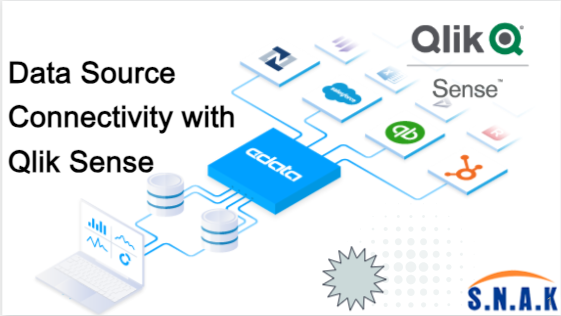July 10, 2023 | SNAK Consultancy
Share on :
Data Source Connectivity with Qlik Sense for Enhanced Analytics

Unlocking the power of data is essential for organizations seeking to make data-driven decisions. Qlik Sense, a leading self-service analytics platform, offers a plethora of features and functionalities to help users visualize and explore data effectively. One of its core strengths lies in its ability to connect with various data sources, enabling users to access and analyze data from multiple systems. In this blog post, we will delve into the topic of data source connectivity with Qlik Sense, exploring its capabilities and how it enhances the analytics experience.
1. Understanding Data Source Connectivity in Qlik Sense
Connecting to Diverse Data Sources
Qlik Sense provides seamless connectivity to a wide range of data sources, enabling users to tap into valuable information. Whether it's traditional databases, cloud platforms, or spreadsheets, Qlik Sense empowers users to establish connections and extract data for analysis. Supported data sources include popular databases like Microsoft SQL Server, Oracle, MySQL, and PostgreSQL, as well as cloud platforms such as Amazon Web Services (AWS), Microsoft Azure, and Google Cloud Platform (GCP). Users can also import data from spreadsheets, CSV files, and other file formats, ensuring comprehensive data accessibility.
Data Extraction and Transformation
Once connected to a data source, Qlik Sense provides powerful data extraction and transformation capabilities. The built-in data load editor allows users to extract data from multiple sources, apply transformations, and prepare data for analysis. With options to clean, filter, and reshape data, users can ensure data integrity and relevance. These extraction and transformation features ensure that data is in the desired format, ready to be analyzed and visualized within Qlik Sense.
2. Leveraging the Benefits of Data Source Connectivity
Real-Time Data Connectivity
Qlik Sense enables users to establish real-time data connections, ensuring that analysis and visualizations are based on the most current information. By leveraging connectors like Qlik Web Connectors or RESTful APIs, users can fetch real-time data from web services, social media platforms, and other dynamic data sources. This real-time connectivity empowers organizations to make timely decisions, respond to changing conditions, and stay ahead in today's fast-paced business environment.
Associative Data Model and Direct Discovery
Qlik Sense's unique associative data model allows users to connect to large and complex data sources without having to load all the data into memory. This approach, coupled with the Direct Discovery feature, enables users to explore massive datasets in real-time, ensuring fast and interactive data exploration. By establishing dynamic associations between data points, users can uncover valuable insights and identify hidden relationships within the data.
Data Governance and Security
Qlik Sense prioritizes data governance and security. Administrators have granular control over data access rules, ensuring that only authorized individuals can access sensitive information. Encryption protocols can be implemented to protect data during transmission and storage. Monitoring tools provide insights into data usage, allowing organizations to track and manage data access and comply with regulatory requirements effectively.
Questionnaire
Ques.1 What are the data sources you will connect in Qlik Sense?
Ans.In Qlik Sense, you can connect to a wide range of data sources, including popular databases such as Microsoft SQL Server, Oracle, MySQL, and PostgreSQL. You can also establish connections with cloud platforms like Amazon Web Services (AWS), Microsoft Azure, and Google Cloud Platform (GCP). Additionally, Qlik Sense allows you to import data from spreadsheets, CSV files, and other file formats. This diverse connectivity ensures that you can access and analyze data from various systems, enabling comprehensive data exploration and analysis within the Qlik Sense platform.
Ques.2 How do I create a data connection in Qlik Sense?
Ans. Creating a new data connection
- Click Create new connection.
- Select the type of data source you want to create from the drop-down list. The settings dialog, specific for the type of data source you selected, opens.
- Enter the data source settings and click Create to create the data connection.
Ques.3 How do you create a database connection?
Conclusion
Data source connectivity plays a vital role in leveraging the full potential of an analytics platform like Qlik Sense. With its wide range of supported data sources, robust extraction and transformation capabilities, real-time connectivity options, and strong data governance features, Qlik Sense empowers organizations to harness the power of their data. By connecting to diverse systems and extracting valuable insights, users can make data-driven decisions, drive innovation, and achieve business success. With Qlik Sense as a trusted ally, organizations can unlock the true value of their data and embark on a journey of enhanced analytics and informed decision-making.